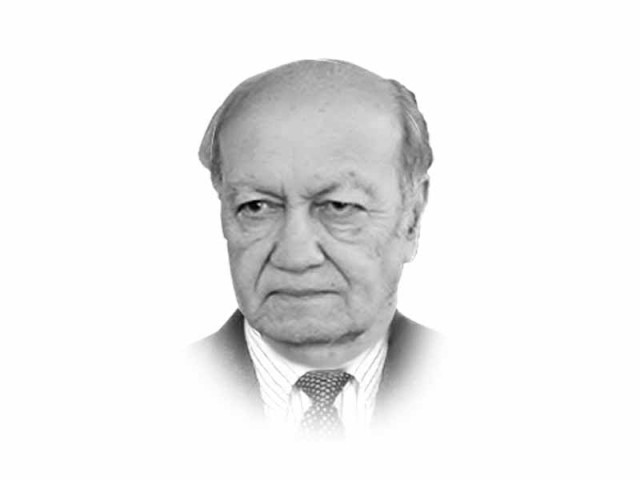Key issues facing Pakistan today
Operation Zarb-e-Azb has made great gains, but the mopping-up operation continues

The writer is a retired lieutenant general of the Pakistan Army and a former federal secretary. He has also served as chairman of the Pakistan Ordnance Factories Board
Internally, the government is under considerable pressure from Imran Khan’s politics of agitation for reforms and accountability. His party, however, is divided on what future line of action to take and its ability to dislodge the government is remote. At best, the protests will be distractive and have a nuisance value. It is in the backdrop of such fractious interparty politics that our national policies, both external and internal, are being framed.
Operation Zarb-e-Azb has made great gains, but the mopping-up operation continues and the rebuilding phase, which involves the complete demobilisation of jihadi groups, the reintegration of jihadists in the mainstream and the development of devastated areas in which the civilian government has a major role, is yet to mature. Economic development and political reforms are still awaited and should be given high priority by the federal government.
Through heavy borrowing and support from the IMF, the economy has stabilised, but absence of foreign investment and a drop in exports and remittances are not healthy signs. There is greater emphasis on getting assistance from abroad rather than creating favourable conditions for generating wealth from within. Pakistan remains one the most tax-burdened countries in the world and the primary reason is the government’s inability to tax the rich. In these adverse circumstances, the government has to deliver on targets set for the CPEC and bring about a qualitative improvement in the energy situation by 2018. The successful implementation of the CPEC would in large part depend on how efficiently the government plans and executes its responsibilities and improves the overall security situation. It has been subjected to intense criticism for not doing enough for raising the Kashmir issue at international forums and in world capitals. While we should raise the profile of the Kashmir resistance, we should also take preventive measures against increased Indian activities both in the form of destabilising efforts and maligning us internationally on some of our imaginary and real weaknesses. A very obvious Indian response has been to become the champion for Baloch dissidents and whip up anti-Pakistan elements in Gilgit-Baltistan. In our principled support for the Kashmiris, we have in the past given sustenance to militant groups like the Lashkar-e-Taiba, which has seriously compromised our national position and provided an easy way for India to defame us and allowed it to twist the peaceful Kashmir struggle for propaganda against us. We have seen that the Afghan and Indian governments are providing sanctuaries to the TTP as a retaliatory measure for our perceived support of the Afghan Taliban and the Haqqani network, and what is troubling is that the US looks the other way as it keeps up with its policy of pressuring Pakistan. As tensions with India escalate, focus on curbing insurgency in Fata may weaken to the detriment of achieving peace. Pakistan’s recent measures to manage the Pak-Afghan border have been positive and will prevent the flow of illegal trade, drug trafficking and crossing over of militant groups. Over the long term, this will help in building a sense of national identity. Regrettably, this has angered the Afghans for which there is no justification as these posts are manned on Pakistani territory.
The success of our policies in all these areas, especially in matters of security, politics, diplomacy and economy, will determine how Pakistan will develop in the coming years. For this we need a well-coordinated national effort that can come about through the maximum actualisation of state institutions at the federal and provincial levels. We also need harmony and synergy between institutions, which is largely absent or weak at present. For this, a greater level of maturity is needed on the part of politicians and the military. Clarity in policies only comes about when national issues are debated and analysed by the cabinet, parliament, its various committees and on specific designated forums. High priority tasks such as implementation of the National Action Plan have failed to invoke the interest and commitment that these demanded. The PM’s recent appointment of General Janjua as his coordinator to monitor the implementation phase is reassuring, but we have to wait to see its impact. Sadly, with corrective measures being taken to streamline the functioning of madrassas in Sindh, religious parties are now up in arms as though these are entities above the law. Similarly, political parties are reluctant to shed their militant wings, especially in Karachi. The recent confrontation between the Rangers and the MQM bears sad testimony to the latter’s inability to discard its old policies and adopt civilised, democratic practices and ethos. We have to find ways of solving these formidable challenges and recast our future. But this would require a capable leadership having vision and commitment to chart new pathways.
Published in The Express Tribune, August 24th, 2016.
Like Opinion & Editorial on Facebook, follow @ETOpEd on Twitter to receive all updates on all our daily pieces.
















COMMENTS
Comments are moderated and generally will be posted if they are on-topic and not abusive.
For more information, please see our Comments FAQ